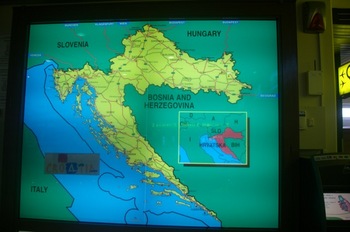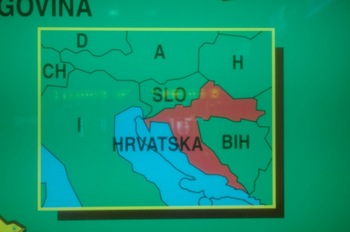We are developing the social individualist meta-context for the future. From the very serious to the extremely frivolous... lets see what is on the mind of the Samizdata people.
Samizdata, derived from Samizdat /n. - a system of clandestine publication of banned literature in the USSR [Russ.,= self-publishing house]
|
Here be dragons Yesterday, upon arriving at Pula airport in Croatia, I found a helpful map on one of the walls, showing the highlights of the country, and with a useful inset showing where Croatia fits in with other nearby countries.
I suppose they could have sent explorers to discover what actually exists in that uncharted wilderness to the east of Zagreb and Bosnia, but I suspect it was not worth it.
|
Who Are We? The Samizdata people are a bunch of sinister and heavily armed globalist illuminati who seek to infect the entire world with the values of personal liberty and several property. Amongst our many crimes is a sense of humour and the intermittent use of British spelling.
We are also a varied group made up of social individualists, classical liberals, whigs, libertarians, extropians, futurists, ‘Porcupines’, Karl Popper fetishists, recovering neo-conservatives, crazed Ayn Rand worshipers, over-caffeinated Virginia Postrel devotees, witty Frédéric Bastiat wannabes, cypherpunks, minarchists, kritarchists and wild-eyed anarcho-capitalists from Britain, North America, Australia and Europe.
|






I know my personal map shows West-BY-GOD-Virginia and where Ohio is the map reads “Here There Be Bad Drivers.” There are other lesser states on the map and, I dunno, some countries like Canuckistan or Africa or something, but I’ve never looked that closely at the map.
Now that is one damned indefensible country.
Pola was Italian in WW2 and for those that remember the battles in Mediterranean was the name of an Italian heavy cruiser that stopped when hit by a British aerial torpedo and lead to the slaughter of Matapan. I have difficulty calling it a battle.
“I have difficulty calling it a battle.”
Wikipedia doesn’t seem to share your difficulty. The Italian losses were:
1 battleship heavily damaged
3 heavy cruisers sunk
2 destroyers sunk
2,300+ dead
British looses, light damage and three dead. Looks like a battle to me. Unbalanced, but look who we’re talking about.
The Wiki adds that after Matapan the Italian Navy conceded the Eastern Med to the UK – actually, they say “the Allies” which I guess would be British Empire plus the Free Poles, since other countries were still considering their options – which makes it not merely a battle but a strategic victory.
The Battleship was damaged earlier.
The Italians didn’t know British was there(by their own fault) so battleships firing at point blank range is not a battle by my standards.
The rest is not true. The German take over of Crete made things very difficult for British mid 41 and when Italian frogmen heavily damaged 2 battlehips in December there was nothing that British had there for good period.
1) The map appears to be backlit; correct?
2) The inset has no space for borders or labels east of Bosnia; the main map has no borders except Croatia’s. So it appears that the lack of information about Serbia is more inadvertent than deliberate. Although there is probably room for a label next to Beograd on the main map, where
Serbia borders Croatia.
Rich: Yes, it’s backlit.
You are more generous than I am, I fear. To me there looks to be enough space (although not that much) in the main map in territory that is Serbian and in which to fit the word “Serbia”. As for both maps (and the inset particularly) I tend to think that the placement of the map edges is deliberate too. They have gone to quite a bit of trouble to show as little of Serbia as possible, as well as to not label it.
luckyluck: Pula was Italian between WWI and WWII, ruled by the Austro-Hungarian empire before that, the Venetians before that, and various other empires over the millennia before that. Given that the most striking structure in the town is a breathtakingly magnificent Roman amphitheatre, Italian influence appears to go way back.